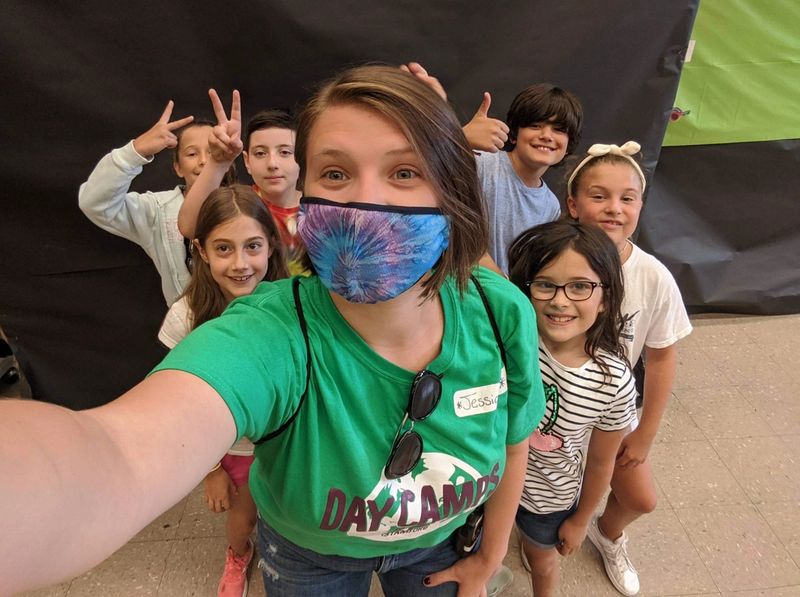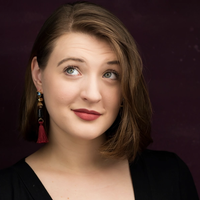The Pandemic: Finding Opportunities Within the Challenges
posted on May 10 2021
There are many difficulties presented by the COVID-19 pandemic, including the regulations and protocols surrounding theatre and camp. It is important, however, as educators, for us always to be searching for opportunities for innovation in every situation.
While there are many challenges we are facing, almost everything can be turned into a teaching moment, or spun in a different light and applied to the work we are doing. Below, you will find a few of the COVID protocols camps may be implementing this year, and how teaching artists can spin them into “drop-the-mic” moments of theatre education!
Masks

Use Body Language!
While we may not be able to see kids’ entire faces this summer, we can encourage them to use other parts of their bodies to tell a story. Remind campers that no matter what time we are living in, it is important to tell stories and create unique characters with their eyes, hands, and body language.
Projection is Important!
Masks can make it hard to hear campers when they are performing. Use this as an opportunity to remind them of the importance of projection and annunciation when singing and acting.
Masks have always been a part of theatre!
This just happens to be a year where we don’t have a choice about wearing them. In your production planning, consider if there may be an opportunity for you to incorporate masks into your production as more than just a requirement.
Distancing
Spots Rock!
“Spots” are a great way to ensure you are keeping kids distanced while rehearsing. “Spots” can take the form of tape on the floor, actual rubber spots, or some other type of marker. Kids can have their own “spot” from where they rehearse each day.
Spots can be used to teach about theatre!
One type of “spot” is spike tape, which shows actors where to stand and where to place props on stage. Use spike tape to keep kids distanced while teaching them about this element of theatre.
Spots can be used in games and challenges!
Challenging students to see who can stay on their spot for an entire rehearsal, or seeing who can stay on their spot without falling off during a game of freeze dance are ways to ensure campers stay in their place while making it fun. Spots also fit naturally into games like Museum/Statues, and can be used in adapted versions of games like “Transformers” and “Charades.”
Create solo moments!
Since we may not be able to have a large group of students on stage at once, it will be important to create show-stopping solo moments for multiple campers, where a smaller group or a single student can be on stage for a time by themselves.
Working Outdoors
Use what you’ve got!
Many of these camps have beautiful campuses with trees, flowers, and grass abound. Do what you can to take advantage of these things! Does a certain tree provide some nice shade for a break? Does a specific patch of grass provide a great spot for soloists to rehearse on their own where you can see? Are there sticks laying around that might be able to work as great rehearsal props or “spot” markers (as long as kids can act appropriately with them)? We encourage you to get creative with the outdoor space provided to you!
Talk about Projection!
Masks may make hearing kids hard, but it is especially hard when you are outside with other activities going on, and the sounds of nature all around. Encourage campers to project and annunciate while they are working outside – always reminding them that this is an important thing to remember as a performer in or out of a mask.
Take Breaks!
It is going to be hot at camp! The middle of the day in July and August can be especially intense. Remember that when rehearsing outside, your campers may need more breaks then normal. If you are allowed to take them for breaks into an air-conditioned space, do so! If not, take them to get water every 20 minutes or so, and allow them to sit for a moment and recharge when necessary. Also, be on the lookout for kids who are breathing heavily, are unable to focus suddenly, or complain of feeling lightheaded. These could be signs of heat exhaustion, and they should be taken to the nurse.
Minimize distractions!
This summer, more campers will be outside for the full day than usual. You will inevitably hear and see other groups of campers nearby, participating in other activities. Your campers may want to say hi to their friends or other counselors, and other campers may approach your group, but it is important that you do your best to minimize these distractions so that you and the campers can focus on rehearsal or class. You can do this by looking for an outdoor space that is out of the way from other activities, starting off the summer with a conversation about the importance of focus, and taking frequent breaks so that students are less prone to distraction.
Learn More About How We're Taking Safety Seriously This Summer!

posted on May 10 2021
Jessica Ashleigh Pomeroy is an NYC based director, producer, performer and teaching artist. She holds a BFA in Dramatic Arts with a Concentration in Directing from The New School for Drama. Jessica grew up in Connecticut, where she first discovered her love of theatre, a love that only grew as she got older, and that she is passionate about sharing with young people. Jessica looks to bring professional level performance training to young performers, and seeks to do just that through her training and experience as a singer, actor and director.
